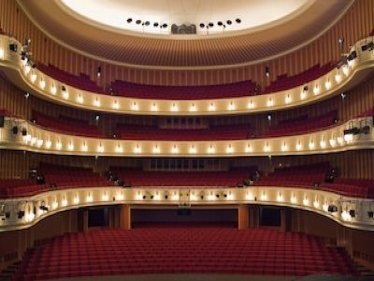Romeo et Juliette - Schedule, Program & Tickets
Romeo et Juliette
Date:
Time:
Price class:
Location:
30.03.2019 , Saturday
19:30
B
Opernhaus Düsseldorf,Heinrich-Heine-Allee 24 40213 Düsseldorf
CAST
JULIETTE
Luiza Fatyol
GERTRUDE
Marta Márquez
TYBALT
Ibrahim Yesilay
PARIS
Richard Šveda
GRAF CAPULET
Michael Kraus
GRÉGORIO
Daniel Djambazian
ROMÉO
Ovidiu Purcel
STÉPHANO
Maria Boiko
MERCUTIO
Bogdan Baciu / Dmitri Vargin
FRÈRE LAURENT
Bogdan Talos
HERZOG VON VERONA
James Martin / Lukasz Konieczny
CHOR
Chor der Deutschen Oper am Rhein
ORCHESTER
Düsseldorfer Symphoniker
It is the most classical of all tragic love stories: an emotional roller-coaster ride for two people who fall passionately in love with one another and are dragged into a deadly vortex due to the irreconcilable conflict between their two families. Violence rules on both sides. Encounters – whether wanted or unwanted – demand casualties and deaths. “‘Tis but thy name that is my enemy... Romeo, doff thy name,” Shakespeare’s Juliet begs. But the catastrophe cannot be averted and ends with both their deaths – which are all the more tragic for being based on a misunderstanding.
In his adaptation of Shakespeare’s ‘Romeo and Juliet’, Charles Gounod (1818–1893) created one of the most moving versions for the operatic stage. The very first bars of the overture make the threat of disaster evident in a way that gets under the audience’s skin. In four great duets he focusses in masterly fashion on their burgeoning love and ever increasing passion until they achieve an almost Tristan-like union. In doing so he created a lyric drama that pointed French 19th century opera in entirely new directions – and which can now be seen at the Deutsche Oper am Rhein in a production by young director Philipp Westerbarkei who has already delighted audiences with Bernstein’s ‘Trouble in Tahiti’ and Knussen’s ‘Where the Wild Things Are’.
JULIETTE
Luiza Fatyol
GERTRUDE
Marta Márquez
TYBALT
Ibrahim Yesilay
PARIS
Richard Šveda
GRAF CAPULET
Michael Kraus
GRÉGORIO
Daniel Djambazian
ROMÉO
Ovidiu Purcel
STÉPHANO
Maria Boiko
MERCUTIO
Bogdan Baciu / Dmitri Vargin
FRÈRE LAURENT
Bogdan Talos
HERZOG VON VERONA
James Martin / Lukasz Konieczny
CHOR
Chor der Deutschen Oper am Rhein
ORCHESTER
Düsseldorfer Symphoniker
It is the most classical of all tragic love stories: an emotional roller-coaster ride for two people who fall passionately in love with one another and are dragged into a deadly vortex due to the irreconcilable conflict between their two families. Violence rules on both sides. Encounters – whether wanted or unwanted – demand casualties and deaths. “‘Tis but thy name that is my enemy... Romeo, doff thy name,” Shakespeare’s Juliet begs. But the catastrophe cannot be averted and ends with both their deaths – which are all the more tragic for being based on a misunderstanding.
In his adaptation of Shakespeare’s ‘Romeo and Juliet’, Charles Gounod (1818–1893) created one of the most moving versions for the operatic stage. The very first bars of the overture make the threat of disaster evident in a way that gets under the audience’s skin. In four great duets he focusses in masterly fashion on their burgeoning love and ever increasing passion until they achieve an almost Tristan-like union. In doing so he created a lyric drama that pointed French 19th century opera in entirely new directions – and which can now be seen at the Deutsche Oper am Rhein in a production by young director Philipp Westerbarkei who has already delighted audiences with Bernstein’s ‘Trouble in Tahiti’ and Knussen’s ‘Where the Wild Things Are’.







